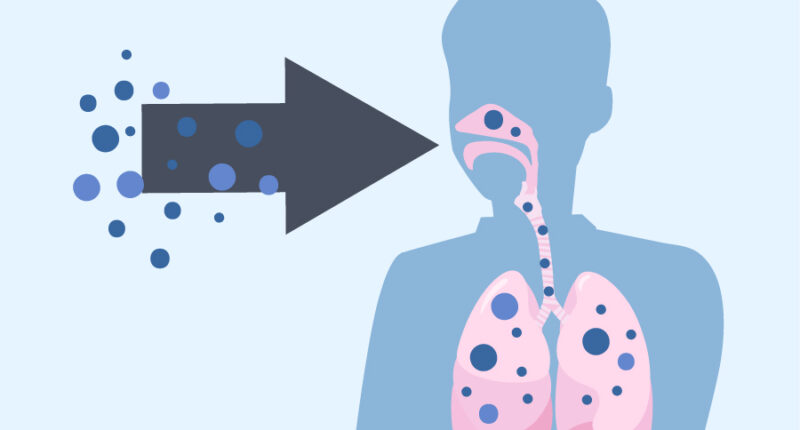Airborne diseases pose a significant public health threat in Nigeria and affect a substantial number of people each year. These diseases are caused by pathogenic microorganisms, including bacteria, viruses, and fungi, which are transmitted through the air.
People can contract these diseases by inhaling contaminated air, coming into contact with infected individuals or objects, or consuming contaminated food or water.
Table of Contents
Here are some of the most common airborne diseases in Nigeria:
1. Tuberculosis.
Tuberculosis (TB) is a bacterial infection that primarily affects the lungs and is spread through the air when infected people cough, sneeze, or spit.
Nigeria has one of the highest TB burdens in the world, with an estimated 157,000 new cases in 2019. In 2020, Nigeria ranked 6th among the 30 countries with the highest TB burden in the world and 1st in Africa.
The disease is most common among people living in poverty, those with weakened immune systems, and people living in overcrowded conditions, especially in rural areas.
To protect yourself from a TB patient, it is important to maintain good hygiene practices, such as washing your hands frequently, covering your mouth and nose when coughing or sneezing, and avoiding close contact with anyone who has symptoms of TB.
2. Meningococcal Meningitis
Meningococcal meningitis is a bacterial infection that affects the membranes surrounding the brain and spinal cord. It spreads through the air when infected people cough or sneeze.
Nigeria is located in the “meningitis belt,” an area in sub-Saharan Africa where large outbreaks of the disease occur every few years. In 2017, Nigeria experienced a major outbreak of meningitis that affected over 14,000 people and resulted in the deaths of more than 1,100 individuals.
Infants, teenagers, young adults, and older adults are at increased risk for meningococcal disease. Additionally, people with weakened immune systems, such as those with HIV or those taking immunosuppressant drugs, are at a higher risk of developing bacterial meningitis.
3. Measles
Measles is a highly infectious viral disease that spreads through the air when infected people cough or sneeze. It causes symptoms such as fever, rash, and other flu-like symptoms.
However, measles can be prevented through vaccination, but vaccination rates in Nigeria are low, leading to frequent outbreaks of the disease.
In 2019, Nigeria experienced over 22,000 suspected cases of measles, resulting in 72 deaths, with the majority of the cases occurring in Borno State.
The high prevalence of measles in Borno State can be attributed to factors such as low immunization rates, overcrowded conditions in internally displaced persons (IDP) settlements, and inadequate health services.
4. Influenza
Influenza, also known as the flu, is a viral infection that affects the respiratory system.
It is spread through the air when infected people cough, sneeze, or talk. Influenza can cause fever, cough, sore throat, and other symptoms, and it can lead to serious complications, especially in people with weakened immune systems or underlying health conditions.
In Nigeria, influenza is a common cause of illness, especially during the rainy season.
UNICEF disclosed in 2021 that Nigeria recorded the highest number of pneumonia-related deaths of children under-five caused by overall air pollution in the world. Additionally, Nigeria also had the highest number of deaths of children under-five caused by household air pollution-related pneumonia.
In fact, in 2019, there were 67,416 deaths of Nigerian children under-five caused by overall air pollution-related pneumonia, while deaths of Nigerian children under-five caused by household-specific air pollution-related pneumonia were 49,591 during the same year.
5. Lassa Fever
Lassa fever is a viral hemorrhagic fever that is endemic in Nigeria and other West African countries. It is spread through contact with infected rodents or their urine or feces, as well as through human-to-human transmission.
Lassa fever causes fever, headache, muscle aches, and other symptoms, and it can lead to severe illness or death.
Lassa fever is most common in rural areas across Nigeria, especially where people live in close proximity to rodents.
One study reported that over 2,000 cases of Lassa fever occurred in Nigeria from 2018-2021.
6. COVID-19
COVID-19 is a viral respiratory illness caused by the SARS-CoV-2 virus. It is spread through the air when infected people cough, sneeze, talk, or breathe.
Nigeria has had over 200,000 confirmed cases of COVID-19, with over 2,500 deaths. The disease has had a significant impact on the country’s healthcare system, economy, and society as a whole.
Conclusion
It is essential for the government, healthcare providers, and individuals to work together to prevent and control these diseases through vaccination, infection control measures, and improved living conditions. With concerted efforts, the burden of airborne diseases can be reduced in Nigeria, leading to a healthier and more prosperous population.









